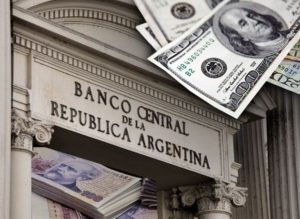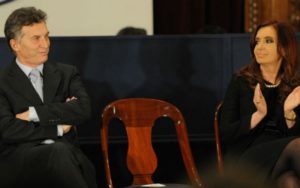In few days, “Cambiemos” Front´s government wasted much of the whole political capital accumulated since December 2015 when Mauricio Macri won the presidential election in second round and especially October 2017, in occasion of his victory in parliamentary ballots. Last weeks, from the end of April and during the beginning of this current May, lots of capitals escaped from our country, provoking an abrupt devaluation of peso, from 20 pesos = 1 dollar to more than 25 pesos = 1 dollar. Inflation, the second in the world, behind Venezuela, has hit 25 per cent, when the initial targeting rates were 15 per cent for this year. This financial situation, in a country with chronic inflation of two digits and three hyperinflations during more than seven decades, complicates once again the macroeconomic context and surely, the political arena. If last November Macri appeared with great possibilities to be re-elected in October 2019, these chances now, seem distant due to the growing generalized criticism and deception, because of expectations of higher inflation and recession. In Argentina, every government, peronist or non peronist, which does not control inflation, is condenmed to lost the next election.

But how can we explain the actual failure of the government which promised really change the Argentine populist past by showing the best team of technocrats and former CEOs of private companies? First of all, it is difficult to explain just because Macri was proud of getting an extraordinary and pragmatist -non ideological- team. Every idea (liberal, populist, socialdemocrat), has failed in Argentina, so they wanted to get another innovative experience. Without presidential discourses, except small spots, without economic program, except a gradualist strategy and with only political communication based on “good news” and “buddhist style”, Macri had been “going up the wave” for the last two years but incredibly, in contrast to any neoliberal administration, he overwasted in previsional state regime and maintained high taxes over the private sector. Meanwhile, the core of his strategy was to finance the country through the international markets. It was possible when the interest rate in The United States of America were slow but in Buenos Aires, nobody took care of the increasing of the rates, this year and clearly, there is no Plan B. The stupid and political decision of violating the independence of Central Bank, past December 28th, in order to stop the free flotation of dollar and by the Keynesian way, reactivating the macroeconomic conditions, only awakened the general distrust of the markets during the last weeks. The CEOs showed the mistake of reading too bad how was the global market reacting to their policies of manipulation of interest rates.
Basically, Argentina has a structural macroeconomic -and political- problem. This is a society which wants to live over their possibilities of financiate them. Its productivity is smaller than its domestic consumption so it produces less dollars than demands. Only the rural sector produces and exports, without subsidies attracting markets like China and the rest of Asia. During the last two years, more than 4,5 million of argentines traveled abroad, spending many dollars, while only one million of tourists visited our country. In sixty years, only four of them, it presented fiscal and commercial surplus in balance of payments. Domestic inflation and external (like now) or internal debt (like during Kirchner populist years), are the typical demonstration of an Argentina looking similar to many emergent but poor countries, like for example, Greece in 2015. The difference is that Greece, one of the mirrors we do not want to observe ourselves, is supported by European Union and maybe, Germany. Behind Argentina, the IMF now is the unique alternative, but our history with the multilateral financial organism is so bad, because of our broken promises against its punishments of austerity policies which Argentine middle class -with subsidies like free public education and health and foreign tourism- resists. So, the decision of delaying the economic structural adjustment avoiding a shock therapy because it is unpopular, is political. President Macri, like Tsipras in Greece three years ago, wanted to win time but markets tolerated his policy only for two years. And now, time is over.
The other mirror where we do not look alike, is the leadership´s style which we approved and voted last seventeen years: Cristina Fernández (CFK, widow of Néstor Kirchner) and Mauricio Macri. In theory, they look opposite and if Cristina, from a middle class family, selfname populist, like Hugo Chávez, Macri, from a aristocratic family, appears like republican, pragmatist and antipopulist, maybe similar to President Macron in France. But in the real world, the similarities are bigger between CFK and Macri and the markets which are not ideological, has already been discovered. In psychological and sociological terms, CFK and Macri explain many of the original sins of the civic culture in Argentina. They both are hyperpresidentialists, mid-monarchists, insecure and closed minds. They talk about teams or cabinets, but one and the other only trust in their shadows, with so many opportunist obsecuents around them. They both govern thinking in short term, without a vision or objetives of long term. The two Presidents dissimulate their insecurities with rhetoric but without any content. For them, politics looks like a game, where they both are capricious and worry to win only. Communication matters but it is not useful and efficient. Meanwhile, CFK used national broadcasting like Chávez, for not to tell nothing important to the people, Macri was using an army of young trolls and bots in social networks, to discuss and criticize the opposition, without any objective. They look disconnected of reality of consumption in supermarkets, quality of goods and services, impact of domestic prices and every single thing that argentines live, enjoy or suffer. In this closed economy, every product costs the double than in the rest of emergent countries, like Russia.

Perhaps there are two differences between CFK and Macri. The “kirchnerism” used barbaric manners. “Macrism” uses good formal and diplomatic style. But they both are arrogant and ignorant of reality. In the issue of international arena, while Argentina during CFK era, has had an antiimperialist and antiglobalist discourse, enjoying the best prices of soybeans and other commodities in 150 years. On the contrary, Macri is a declared pro-world opening, has a closed world with Trump, protectionism and Brexit, so our Presidents have a ridiculous and out of time lecture of the political global environment.
So, I am asking, which historical sin has committed Argentina to deserve these recent leaderships? And I can not find an easy answer. Except Macri would change seriously and deeply his cabinet, we can expect more uncertainty and turbulence, next weeks or months. But maybe, who knows, we must remain trapped by the hard and suffering adjustment which the liberal economists proposed two years ago and Macri postponed until now. And the future imagined by CFK was: the popular failure of Macri -today, with 40 per cent of social approval-, will be the best way for her to regain the political power in 2019.






Andrés Malamud y su visión del desafío de Macri. https://marcelolongobardi.cienradios.com/malamud-esta-crisis-se-termino-manana-puede-empezar-otra-la-argentina-pies-barro/?utm_source=Twitter&utm_medium=nota&utm_campaign=twitter-marcelolongobardi
Un Longobardi escéptico por la cultura política de la dirigencia argentina. https://marcelolongobardi.cienradios.com/argentina-quintaesencialmente-kirchnerista/?utm_source=Twitter&utm_medium=nota&utm_content=marcelolongobardi&utm_campaign=twitter-radiomitre
Según Nielsen, el gobierno de Macri compró tiempo. https://marcelolongobardi.cienradios.com/guillermo-nielsen-se-compro-tiempo/#cxrecs_s
Un programa imperdible de “La Mirada de Roberto García”. https://www.youtube.com/watch?time_continue=2&v=iEOh-e-8uBE
Carlos Arbia: Macri ganó la batalla pero no la guerra. https://www.infobae.com/economia/2018/05/19/operacion-bote-como-se-gesto-el-apoyo-de-empresarios-y-banqueros-al-gobierno-para-frenar-la-crisis-cambiaria/
Beatriz Sarlo y el desprecio de la política tradicional por parte de Macri. http://www.perfil.com/noticias/columnistas/la-palabra-caballo-no-relincha.phtml
Durán Barba hace responsable de la crisis, a la oposición demogógica. http://www.perfil.com/noticias/columnistas/semana-mentirosa.phtml
Cómo queda el gobierno de Macri después del sofocón cambiario. http://berensztein.com/evaluacion-de-danos-despues-del-sofocon/
Los grandes desacuerdos nacionales, según Berensztein. http://berensztein.com/grandes-desacuerdos-nacionales/